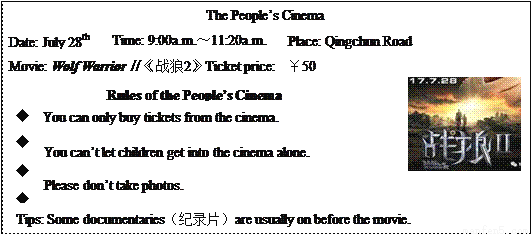
 �¿α�����Ķ�ѵ��ϵ�д�
�¿α�����Ķ�ѵ��ϵ�д� ������������Ӧ����ϵ�д�
������������Ӧ����ϵ�д�
| �꼶 | ���пγ� | �꼶 | ���пγ� |
| ��һ | ��һ��ѿγ��Ƽ��� | ��һ | ��һ��ѿγ��Ƽ��� |
| �߶� | �߶���ѿγ��Ƽ��� | ���� | ������ѿγ��Ƽ��� |
| ���� | ������ѿγ��Ƽ��� | ���� | ������ѿγ��Ƽ��� |
��Ŀ������Ӣ�� ��Դ���㽭ʡ����2017-2018ѧ�����꼶��һѧ����ĩ����Ӣ���Ծ� ���ͣ��Ķ���ѡ

1.People can see the movie on .
A. July 18th B. July 28th C. June 18th D. June 28th
2.When does the movie Wolf Warrior�� begin?
A. At 9:30 a.m. B. At 9:30 p.m. C. At 9:00 a.m. D. At 11:20 a.m.
3.Jim wants to see the movie with his friends Lily and Lucy. How much should they spend on the tickets?
A. ��25. B. ��50 C. ��100. D. ��150.
 1.B
2.C
3.D
��������
����Ϊ��Ӱ�������ں���������ˡ�ս��2������ӳ���ڡ���ӳʱ���Ʊ�ۡ��Լ�Ҫ��
1.ϸ�������⡣���ݱ������ݣ�������7��28�ſ�֪��������7��28�ſ��Կ���ս��2���ⲿ��Ӱ����ѡB��
2.ϸ�������⡣�ɲ��ŵ�ʱ��9:00a.m.��11:20a.m. ��֪�� ��ս��2�� ���ŵ�ʱ��Ϊ�����9:00����ѡC��
3.���ּ����⡣...
1.B
2.C
3.D
��������
����Ϊ��Ӱ�������ں���������ˡ�ս��2������ӳ���ڡ���ӳʱ���Ʊ�ۡ��Լ�Ҫ��
1.ϸ�������⡣���ݱ������ݣ�������7��28�ſ�֪��������7��28�ſ��Կ���ս��2���ⲿ��Ӱ����ѡB��
2.ϸ�������⡣�ɲ��ŵ�ʱ��9:00a.m.��11:20a.m. ��֪�� ��ս��2�� ���ŵ�ʱ��Ϊ�����9:00����ѡC��
3.���ּ����⡣...�鿴�𰸺ͽ���>>
��Ŀ������Ӣ�� ��Դ���˽̰����꼶Ӣ���ϲ�Unit8���Ծ� ���ͣ���ѡ��
�� When is Jay Chou's concert?
��It's _____ three o��clock _____ the afternoon.
A. at;in B. at:on C. in;in D. on;in
 A
��������
���⣺�����ܽ������ֻ���ʲôʱ������������3���ӡ�
in+��/��,��ʾ��ij���ij�£�on+�������ڣ���ʾ�ھ���ijһ�죻at+�ӵ㣬��ʾ�ڼ����ӣ���һ�ս�three o��clock��֪�˴���ʾ��3���ӣ����ý��at���ڶ��ո��ݶ���in the afternoon����ѡA��
A
��������
���⣺�����ܽ������ֻ���ʲôʱ������������3���ӡ�
in+��/��,��ʾ��ij���ij�£�on+�������ڣ���ʾ�ھ���ijһ�죻at+�ӵ㣬��ʾ�ڼ����ӣ���һ�ս�three o��clock��֪�˴���ʾ��3���ӣ����ý��at���ڶ��ո��ݶ���in the afternoon����ѡA���鿴�𰸺ͽ���>>
��Ŀ������Ӣ�� ��Դ��ţ�����ְ���꼶Ӣ���²ᵥԪ�����ϰ�� (8B Unit 7) ���ͣ�������������
�������Ķ�������ģ������ݸ�����������ĸ����ʾ��д��һ�����ʵ�Ӣ�ﵥ����������ȷ����ʽ��ʹ����ͨ˳��
An 8-year-old Miami boy, Joshua Williams, is president of his own non-profit organization---Joshua��s Save the World. His organization provides food and clothes for p1.people and families in Miami and the neighboring areas.
Joshua has r2.thousands of dollars for his organization. He started to help the hungry when he was just 5. He was in his mother��s car when they passed a beggar. Joshua asked his mother to stop so that he could give him $20. ��It��s my pocket m3.. I want to help him, Mum,�� Joshua recalled. One year later, he created his organization with the help of his mother and Francine Hanna, a local businesswoman. ��He just thought that was what he wanted to do,�� his mother said. ��And there was nothing that could s4.him.��
The organization now provides clothing, furniture and food for the poor people in America. At the same time, Joshua never misses a c5.to ask other people to follow what he did whether at church or on the streets. Earl Laird l6.his job two years ago and hasn��t managed to get a n7.one. Without money, he can��t p8.for the flat and has to live on the street. He depends on food from Joshua��s Save the World. ��Joshua is an angel (��ʹ) from God,�� he said.
Joshua has won Miami��s ��Do the Right Thing�� award and the ��Kids Who Care�� competition, which awarded him a $1,000 note. Even though he has a9.done a lot, he said that his mission (ʹ��)to provide for the poor is f10.from finished. ��I want to get a team together,�� Joshua said. ��I want my team to go out and give food to people who have a need for it. I want to spread love to countries in Africa.��
 1.
2.
3.
4.
5.
6.
7.
8.
9.
10.
��������
���Ȿ���ڽ���һ����ͺ�С�����꣬Լ���ǡ���������ĸ��һλ���ص����˰����£��齨��һ����֯�������֯Ϊƶ������ṩ�·����Ҿߺ�ʳ��������Ѿ�Ϊ��֯�O����ǧ��Ԫ�����������ǽ��Ŷӵİ�����Χ����ȫ���硣
1.
2.
3.
4.
...
1.
2.
3.
4.
5.
6.
7.
8.
9.
10.
��������
���Ȿ���ڽ���һ����ͺ�С�����꣬Լ���ǡ���������ĸ��һλ���ص����˰����£��齨��һ����֯�������֯Ϊƶ������ṩ�·����Ҿߺ�ʳ��������Ѿ�Ϊ��֯�O����ǧ��Ԫ�����������ǽ��Ŷӵİ�����Χ����ȫ���硣
1.
2.
3.
4.
...�鿴�𰸺ͽ���>>
��Ŀ������Ӣ�� ��Դ���˽̰���Ŀ��Ӣ����꼶�ϲ� Unit 8 Section A 3a-4c ������ϰ�� ���ͣ���ѡ��
These days, something unusual ____ in our town.
A. happen B. happens C. Is happening D. Is happened
 C
��������
���⣺��Щ�죬һЩ��ͬѰ��������������������ˡ�happen����������ԭ�Σ�happens�����˳Ƶ�����ʽ��is happening���ڷ��������ڽ���ʱ̬��is happened�DZ�����̬����ʽ����happen�������ڱ�����̬�����ݾ���;��е�These days��֪������˵�����ֽ�һֱ�ڷ��������飬Ӧ�����ڽ���ʱ̬����ѡC��
C
��������
���⣺��Щ�죬һЩ��ͬѰ��������������������ˡ�happen����������ԭ�Σ�happens�����˳Ƶ�����ʽ��is happening���ڷ��������ڽ���ʱ̬��is happened�DZ�����̬����ʽ����happen�������ڱ�����̬�����ݾ���;��е�These days��֪������˵�����ֽ�һֱ�ڷ��������飬Ӧ�����ڽ���ʱ̬����ѡC���鿴�𰸺ͽ���>>
��Ŀ������Ӣ�� ��Դ���˽̰�Ӣ����꼶ȫ����ϰ�⣺Unit 6 When was it invented5 ���ͣ���ȫ�Ի�7ѡ5
���ݶԻ����ݣ��ӷ�����ѡ���ʵ���ѡ�ȫ�Ի���(���������)
M��Jane, how do you like the soup with Fanqie and eggs cooked by me?
W��It��s nice.1.
M��It��s another way of calling tomatoes. Fan as well as Hu means something from a foreign country.
W��2.
M��Yes. It came to China in the 13th century.3.
W��When were tomatoes brought to China?
M��In the 17th century.4.
W��What were they grown for then?
M��They were grown as a kind of bonsai(����). Chinese people used to think them poisonous(���). 5. And when they began eating them at table, they fell in love with the nice taste.
A. I don��t like eating potatoes.
B. So Huluobo comes from a foreign country, right?
C. But what do you mean by Fanqie?
D. People in Europe didn��t dare to eat tomatoes at first, either.
E. When did people begin to eat them?
F. But Chinese people didn��t eat tomatoes then.
G. But now we usually call them carrots.
A. I don��t like eating potatoes.
B. So Huluobo comes from a foreign country, right?
C. But what do you mean by Fanqie?
D. People in Europe didn��t dare to eat tomatoes at first, either.
E. When did people begin to eat them?
F. But Chinese people didn��t eat tomatoes then.
G. But now we usually call them carrots.
 1.C
2.B
3.G
4.F
5.D
��������
���´��⣺�����Ǽ����һ���˵ĶԻ����ɼ�����һ���ˡ����ѡ���ʲô��˼���������˶��������ʵ����ۡ�������������һЩ���ڡ������������⡣
1.��������It's another way of calling tomatoes. ����������������һ�ֽз�����֪�˴��ʵ��ǣ������ѡ���ʲô��˼���ʴ�ѡC��
2....
1.C
2.B
3.G
4.F
5.D
��������
���´��⣺�����Ǽ����һ���˵ĶԻ����ɼ�����һ���ˡ����ѡ���ʲô��˼���������˶��������ʵ����ۡ�������������һЩ���ڡ������������⡣
1.��������It's another way of calling tomatoes. ����������������һ�ֽз�����֪�˴��ʵ��ǣ������ѡ���ʲô��˼���ʴ�ѡC��
2....�鿴�𰸺ͽ���>>
��Ŀ������Ӣ�� ��Դ���˽̰����Ӣ���²�Unit 12 Life is full of the unexpected. ���ͣ���ѡ��
I believe what he said. It seems ________ to the fact.
A. close B. closed C. far D. further
 A
��������
���⣺���������Ļ������Ļ��ƺ��ӽ���ʵ���������ݴʡ�A. close�ء��ӽ��ģ�B. closed�رյģ�C. farԶ�ģ�D. further��Զ�ġ�����ǰ�� �����������Ļ�������֪���Ϊ�����Ļ��ƺ��ӽ���ʵ����seem������ݴʣ�close�ڴ������ݴʣ���Ϊ���ӽ��ġ�����closed�����ݴʣ�һ��ָ�š������ǡ��رյġ�������Aѡ��������⣬�ʴ�ѡA��
A
��������
���⣺���������Ļ������Ļ��ƺ��ӽ���ʵ���������ݴʡ�A. close�ء��ӽ��ģ�B. closed�رյģ�C. farԶ�ģ�D. further��Զ�ġ�����ǰ�� �����������Ļ�������֪���Ϊ�����Ļ��ƺ��ӽ���ʵ����seem������ݴʣ�close�ڴ������ݴʣ���Ϊ���ӽ��ġ�����closed�����ݴʣ�һ��ָ�š������ǡ��رյġ�������Aѡ��������⣬�ʴ�ѡA���鿴�𰸺ͽ���>>
��Ŀ������Ӣ�� ��Դ���˽̰���꼶�²�1--3��Ԫ���Ծ� ���ͣ���ѡ��
�����ģ�---Could you please _________your bike here?
A. don��t stop B. not to stop
C. not stop D. not stopping
 C
��������
���⣺���㲻Ҫ�����г�ͣ�����������Could you please do sth? ���������������𣿡�please��Ӷ���ԭ�Σ� ����Է���ת������������Ҫ�����е�could �DZ�ʾ��������ת������˵��������ò�������ʽΪCould you please not do sth? �����㲻Ҫ���������𣿡�����������ַ��÷�����ѡC��
C
��������
���⣺���㲻Ҫ�����г�ͣ�����������Could you please do sth? ���������������𣿡�please��Ӷ���ԭ�Σ� ����Է���ת������������Ҫ�����е�could �DZ�ʾ��������ת������˵��������ò�������ʽΪCould you please not do sth? �����㲻Ҫ���������𣿡�����������ַ��÷�����ѡC���鿴�𰸺ͽ���>>
����ʡ������Υ���Ͳ�����Ϣ�ٱ�ƽ̨ | �����к���Ϣ�ٱ�ר�� | ����թƭ�ٱ�ר�� | ����ʷ���������к���Ϣ�ٱ�ר�� | ������Ȩ�ٱ�ר��
Υ���Ͳ�����Ϣ�ٱ��绰��027-86699610 �ٱ����䣺58377363@163.com